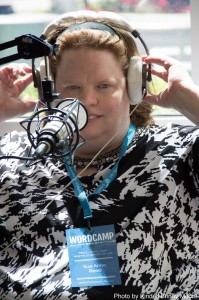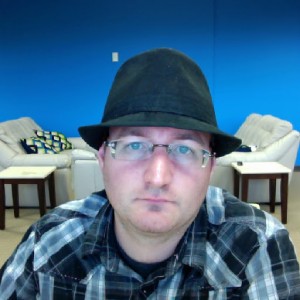John Housholder, founder of Ah So Designs and co-organizer of Nashville WordCamp, Nashville WordPress Meetup, and WPNashville.com, spoke with Nashville podcaster Clark Buckner about organizing WP Nashville events, his thoughts on the local tech community, and offered a few tips on effectively communicating with developers.
WordCamp Nashville grew out of a conversation at a local coffee shop in 2010 when Housholder ran into Randy Hicks and Scott McIntosh, who had started the WordPress Nashville meetup group. While McIntosh decided to handle the Meetup group, Hicks and Housholder focused on WordCamp.
Housholder described himself as the visionary of the team while Hicks concerned himself with processes and getting things done. At the first WordCamp Nashville, around 200 people attended, most of whom were students or walk-ins. It is a now an annual event that gets better every year.
As for meetups, WordPress user meetups take place on the third Monday of every month and attendance averages 40 people. WordPress developer meetups typically occur once a month on Tuesday mornings and feature a food provided by Chef Kenneth White from Supercollider. And now, any member of WordPress Nashville can suggest and organize an event, even something as simple as meeting for coffee one Saturday to help each other with websites.
WordPress and Nashville’s Tech Community
For Housholder and thousands of users and developers throughout Nashville, WordPress is an important tool for entrepreneurs to broadcast their ideas to the world. No longer is it just a blogging platform. WordPress has become a powerful content management system. Housholder cited the inspiring story of organic chemist-turned-blogger James Ashenhurst as one great example of how much WordPress can change a person’s life.
For developers, WordPress is a great tool to start learning how to develop websites, beginning with CSS and HTML. Housholder’s Ah So Designs can teach new developers to create their own powerful sites in three to four months. Ultimately, Housholder sees WordPress as a great platform for launching careers within the development community.
Communicating Well with Developers
Housholder thinks there’s no reason for entrepreneurs to have to learn how to code. What’s more important is to discover what you’re really good at doing or creating and making your passion your work. Still, businesses need a website, and they need to be able to clearly communicate what they want to developers who won’t know the business’s customers or goals.
Understanding how developers operate helps:
*They can be introverted and quiet.
*They are doers, makers, and crafters.
*They will execute a plan for you.
Householder also suggested effective communication with developers does not including telling them, “Just hurry up, and get it done.” And, if they’re looking at their computer screen, John says try to wait to them. A better time to talk to them might actually be to and from the bathroom, he says.
Moreover, developer evangelists can help people understand how to talk to developers, what to say to developers, and how best to provide information architecture pieces so that a business owner’s website serves his or her needs.
What’s Next for the WordPress Nashville Community?
In hopes of getting the business community involved, Housholder presented the idea of organizing a local web design and development award show for sites built on WordPress or those designed in Nashville. They’re currently in search of partners who may want to help organize such a show. They’re also looking for other development houses, design shops, and WordPress marketers to take part in this project.
To know more about WordPress Nashville or to get involved, visit wpnashville.com and complete a form. Connect with John Housholder on Twitter @jhous1 or @ahsodesigns. Fun fact about John: his dog tweets and one day he even tweeted at me!
This interview was provided by TechnologyAdvice, an Inc. 5000 company that connects buyers and sellers of business technology through meaningful relationships. Interview conducted by Clark Buckner.

 This hard work and dedication to the vision of FoxyCamp paid off, allowing for Luke to leave his “day job” and now work from home with greater flexibility and freedom than ever before.
This hard work and dedication to the vision of FoxyCamp paid off, allowing for Luke to leave his “day job” and now work from home with greater flexibility and freedom than ever before.

